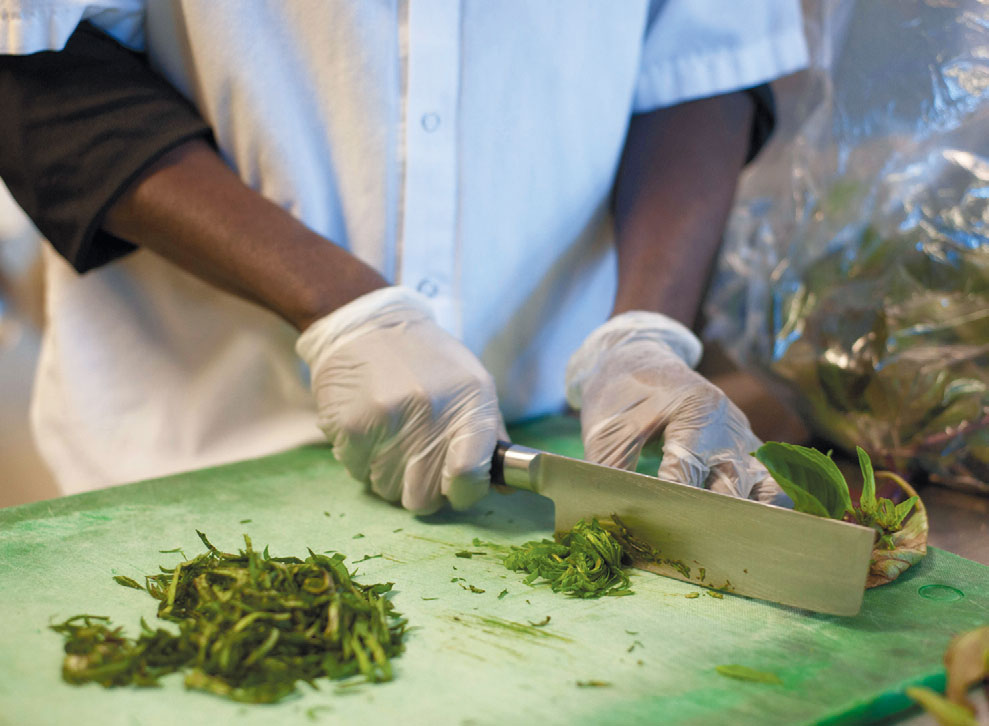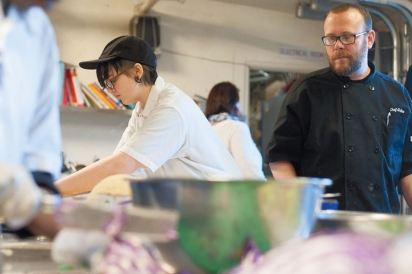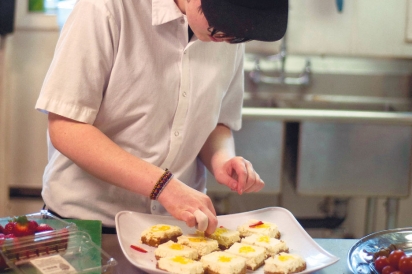The Slow-Cooker Model
Life’s Kitchen helps at-risk teens learn life skills
When Joe Love stepped into Life’s Kitchen at age 17, he was a self-described “bad kid.” Juvenile detention was his second home, drugs were his pastime, he broke into houses for fun and his mother was at the end of her rope. That was back in 2004.
“I started from the bottom, just washing dishes, working until 1am just to keep up, coming home soaked,” he said. Then he smiled. “Now I’m a chef in a restaurant.”
Love’s situation isn’t unique among the trainees at Life’s Kitchen, all between 16 and 20 years old. Most come from troubled backgrounds rife with poverty, homelessness, drug and alcohol abuse, run-ins with the criminal justice system, challenges at school, domestic violence, teenage pregnancy and mental illness.
Life’s Kitchen has a mission to help kids like Love change the trajectory of their lives by training them to work in a commercial kitchen environment. But the program goes beyond catering events and making meals for the Interfaith Sanctuary. Life’s Kitchen also helps kids get their GEDs and teaches them about balancing budgets, finding housing, building resumes and taking care of themselves.
On any given weekday in Life’s Kitchen’s cramped commercial kitchen on the corner of Ninth Street and Royal Boulevard in Boise’s Lusk District, rap music blares and almost a dozen teenagers in chef coats weave around each other carrying industrial-sized baking sheets, gigantic pots and boxes of frozen corn.
They laugh and talk like high school students, but work with the urgency of professional line cooks. One girl has her ears gauged; her friend’s forearm is covered in tattoos. They roast corn kernels, prepare jumbo sausagestuffed mushrooms, spoon out cookie dough and make barbecue sauce.
One of the teens has a perfect cocoa powder handprint on his white chef coat—a literal pat on the back. The environment is fastpaced, but fun and positive. That’s the way Executive Director Jeremy Maxand works hard to keep it.
Maxand took over the 12-year-old organization two years ago. He has experience doing case management for troubled youth in Alaska, so he’s good at breaking through to kids who are sick of being lectured by adults.
“You’ve got the microwave version of job training, but our model is more of the Crock-Pot, slow-cooker model,” Maxand said. “A lot of it [involves] adult mentoring. The vehicle is food and the food service industry, because we want to give them jobs and get them going. But the other component that isn’t as easy to see has to do with giving them healthy, positive exposure to adult role models who can help them develop their purpose and direction and resiliency and ethics and confidence to help them hold a day job and change the trajectory of their lives.”
The nonprofit is funded through donations, grants and training programs for commercial kitchens around town. Life’s Kitchen takes no more than 15 teenagers at a time and each one completes a 40-hour-per-week, 16-week program, which is valued at $3,500 per person, though the teens attend for free. Over the years, Life’s Kitchen has provided more than 260,000 hours of job training and trainees have produced nearly one million free or reduced cost meals for community members.
Life’s Kitchen also has partnerships with a number of local restaurants like Asiago’s, Alavita, Fork, Grind Modern Burger and Pie Hole, where trainees can be placed in kitchen jobs and internships.
Maxand said a lot of kids get attached to the program and struggle when it comes to an end. He said it’s not uncommon to see their mugshots pop up after they graduate, either.
“All the time,” he said. “I reach out, try and give them support and let them know that every day is a new day and they can pick themselves up and they have support and it’s not the end of the world. Our job is to equip them as best we can and support them along the way. We run into adults all the time who were in the program a decade ago, and they’re doing great.”
Adults like Love, who graduated back in 2004. Today, he’s 29, married with two kids and works as the sous-chef at Kahootz Steak & Alehouse in Meridian.
“When I first started [at Life’s Kitchen], I kind of treated it like a joke and I almost got kicked out,” Love said. “Looking back now ... I don’t know what I would have done without that program. My son looks up to me a lot. When he was in kindergarten, at the end of the year all the students had to stand up and say what they wanted to be when they grew up. He said he wanted to be like his dad.”
Like Love’s life trajectory, Life’s Kitchen is also undergoing a transformation. Due to the pending redevelopment of Boise’s Lusk District, the nonprofit plans to build a new job training and food production facility in Garden City, just south of the Waterfront District. Maxand said Life’s Kitchen is fundraising through the fall of 2016, with construction planned for the summer of 2017. He’s confident Life’s Kitchen will remain open through the transition, and there won’t be a gap in training for local at-risk youth.
Recipe for Success
(written by former Life’s Kitchen trainee Connor Powell)
7 unruly teenagers
1 cup of unsolved past mistakes
3 professional chefs
4 office workers
3 gallons of patience
A dash of stern discipline
A fully functional kitchen
Take teenagers and all the other ingredients and put into kitchen. Take teens, tolerance and past mistakes, vigorously beat in mixing bowl with professional chefs. Slowly mix in patience and add stern discipline to taste. Garnish with office staff and serve cold.







